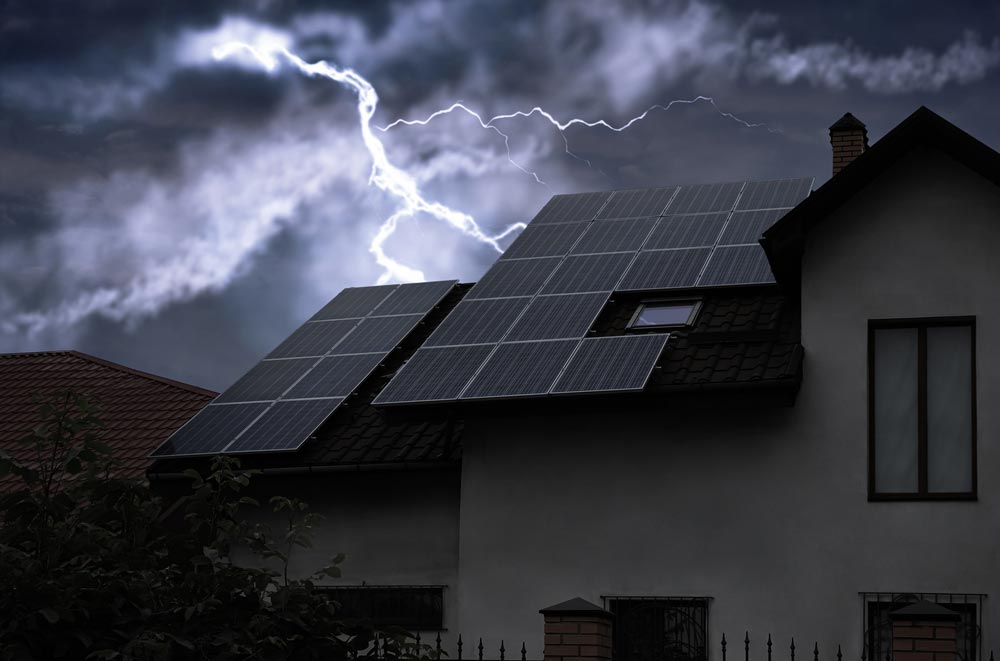The sun produces an infinite amount of energy, which can be harnessed with a sustainable solution. But homeowners need to be informed about the durability of solar panels before they decide to invest in them. Solar panels are durable, but they’re not indestructible. They’re great for homes that are located outside most hurricane zones. But if you live in an area that experiences a great deal of natural disasters (such as hurricanes and hailstorms), you may want to invest in solar panels that are designed for use in those types of climates.
Solar panels can withstand extreme wind speeds, and they don’t break easily when they come in contact with ice pellets produced by hailstorms. But while they can endure these conditions, they may experience some type of damage. You will need to determine how much power has been lost after a storm has hit your home.

Using Solar Panels in a Hurricane Zone
A lot of people don’t realize it, but solar panels can get severely damaged during a hurricane. So, they will need to take certain precautions to keep them protected. While they’re strong and resilient, they’re not immune to the effects of nature’s most powerful forces. If you live in an area that gets frequent hurricanes, you need to know how you can protect your investment. You will need to take certain steps (such as removing or covering your panels), so they can’t get damaged by flying debris or strong winds.
Solar panels are usually safe from any damage caused by strong winds and heavy rain because they’re secured with straps or brackets to keep them from sliding off roof racks, but some homeowners have ended up with damaged solar panels caused by flying debris. You want to make sure your system is properly strapped when you’re installing it. This will keep it from flying off your roof because of strong winds. You also need to be mindful of any leaves or branches blowing into parts of your system.
The Durability of Solar Panels During Hailstorms
The chance of your solar panels getting damaged by hail is very low, but it’s not zero. Solar panels are built to withstand harsh weather conditions (such as strong winds and heavy rain). They can also withstand light to moderate impacts from hail. But if you live in an area that’s more prone to hailstorms (such as Texas), you need to know exactly what happens to solar panels when they’re exposed to hail. You also need to know what steps you can take to protect them.
Hail can damage both the external surface and the internal components of your solar panels, but not all solar panel warranties cover hail damage. Most homeowners’ insurance policies offer hail coverage for solar panels that are installed on roofs, and high-quality panels have a great deal of resistance to hail damage. They have also been tested to withstand these types of weather events.
If the surface of your solar panels gets cracked after a hailstorm, the unit will still work. But they can cause your solar production to decrease. So, they may not operate at maximum efficiency, output, or voltage. You can test this by taking a voltage measurement of the broken panel. You should also take care of these issues early, so the internal components don’t get damaged.
Protecting Your Solar Panels from Lightning Strikes
There’s nothing that will completely protect your solar panels from lightning strikes, but there are some things you can do to protect your system. In most cases, you can keep solar panels from getting damaged by having them installed by a professional. There are also two important things to consider when it comes to protecting them from lightning strikes:
- Grounding — Having a grounding or earthing system installed will be the safest and most effective way to route excess electricity, which will flow back into the ground. They will also protect your solar panels from high-voltage surges that lightning strikes can cause.
- Surge Protection — Installing surge protection devices is a critical part of protecting your solar panels from power surges or voltage spikes that are caused by lightning strikes. Their purpose is to shield your solar panels from high voltages.
Lightning isn’t the only thing to worry about if your solar panels get hit by a summer thunderstorm. They often come with heavy rain and strong winds that can also affect your solar panels. The good news is that they’re remarkably durable in the face of severe weather — that is, if they’re properly installed.
If you’re looking for one of the best places for installing solar panels in Corpus Christi, be sure to reach out to Solar Power Integrator.
